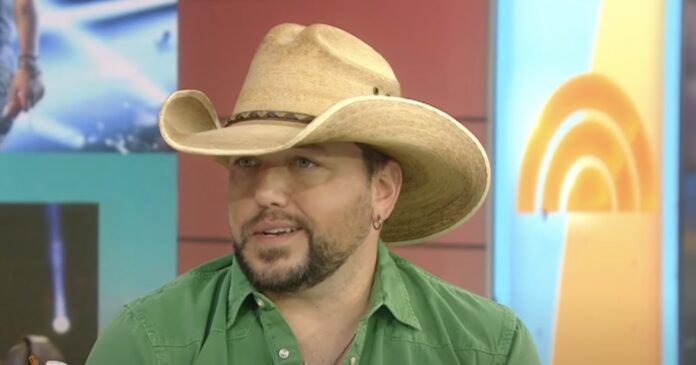OPINION | This article contains commentary that reflects the author's opinion.
“Rolling Stone” magazine, once considered the most influential music magazine of all time, has become increasing bias with far-left commentary.
The magazine has published multiple articles suggesting Jason Aldean’s country song “Try That in a Small Town” is “racist” and “violent.”
Many people responded to “Rolling Stone” by pointing out its hypocrisy for praising rap songs that discuss beating up women, killing police officers, drug dealing, and other serious crimes.
In stark contrast, Aldean’s song celebrates small town America for its love of law and order.
Aldean’s song opposes the destructive “Black Lives Matter” (BLM) protests that caused at least $2 billion in paid insurance claims — the largest in U.S. history. Country Music Television (CMT) caved to pressure and removed Aldean’s song from circulation.
In the music video, Aldean sing as news media companies provide coverage of the violent 2020 BLM riots. Aldean references the liberal protesters by singing about they assault police officers and stomp on the American flag.
The premise of the song is that this violence would never occur in a small town where Americans are more likely to defend themselves and their private property. In a feat of mental gymnastics, left-wing critics claim the song is “pro-lynching.”
Specifically, “Rolling Stone” is accused of praising Ice-T’s 1992 song “Cop Killer”:
This is the outlet that celebrated and defended Ice-T's "Cop Killer", and put him on the cover in regards to that call for violence. Today, they are melting down when Jason Aldean does not call out for violence directly. Grow the hell up. https://t.co/A0MOX7pYoN pic.twitter.com/0uPqzs6x4n
— Brad Slager: CNN+ Lifetime Subscriber (@MartiniShark) July 20, 2023
Has @RollingStone ever done a story about domestic abuse and cop killer lyrics in hip hop? https://t.co/EHKkwk0opo
— GayPatriot (@GayPatriot) July 21, 2023
The song was released back in May, but critics didn’t speak out until two months later. The unjustified outrage caused the song to go viral. It suddenly skyrocketed to number one on iTunes.
Aldean has doubled down on his refusal to apologize for the song. At a concert, he told fans, “Somebody asked me, ‘Hey man, do you think you’re going to play this song tonight?’ The answer was simple. The people have spoken and you guys spoke very, very loudly this week,” Aldean said in reference to the song climbing the music charts.
Aldean has expressed his gratitude to fans for their unwavering support. “Thank u guys,” he wrote to social media. “Ready to see u back out there this weekend!”
Aldean’s wife, Brittany, also thanked fans on social media. “What a week,” she captioned the video, adding a red heart emoji and an American flag.
Thanks to the backlash, “Try That In A Small Town” became a nationally trending topic. Aldean’s song climbed from 987,000 to 11.7 million, which is a 999% increase. The video features Aldean’s two children, Navy and Memphis, who attend attending their father’s shows.
On social media, Aldean responded to critics by saying, “In the past 24 hours I have been accused of releasing a pro-lynching song (a song that has been out since May) and was subject to the comparison that I (direct quote) was not too pleased with the nationwide BLM protests.”
“These references are not only meritless, but dangerous. There is not a single lyric in the song that references race or points to it- and there isn’t a single video clip that isn’t real news footage -and while I can try and respect others to have their own interpretation of a song with music- this one goes too far.”
He continued, “As so many pointed out, I was present at Route 91-where so many lost their lives- and our community recently suffered another heartbreaking tragedy. NO ONE, including me, wants to continue to see senseless headlines or families ripped apart.”
In the past 24 hours I have been accused of releasing a pro-lynching song (a song that has been out since May) and was subject to the comparison that I (direct quote) was not too pleased with the nationwide BLM protests. These references are not only meritless, but dangerous.…
— Jason Aldean (@Jason_Aldean) July 18, 2023
“Try That In A Small Town, for me, refers to the feeling of a community that I had growing up, where we took care of our neighbors, regardless of differences of background or belief,” Aldean explained. “Because they were our neighbors, and that was above any differences. My political views have never been something I’ve hidden from, and I know that a lot of us in this Country don’t agree on how we get back to a sense of normalcy where we go at least a day without a headline that keeps us up at night.”
“But the desire for it to- that’s what this song is about,” he concluded.
The lawlessness of BLM riots caused an estimated $2 billion in damages. The Insurance Information Institute (III), which compiles information from property and casualty insurers, estimated that the damage from the protests would cost the insurance industry up to $2 billion in paid claims. However, this does not include the cost of uninsured losses, which could be significant. BLM protests likely caused far greater damages than $2 billion.






